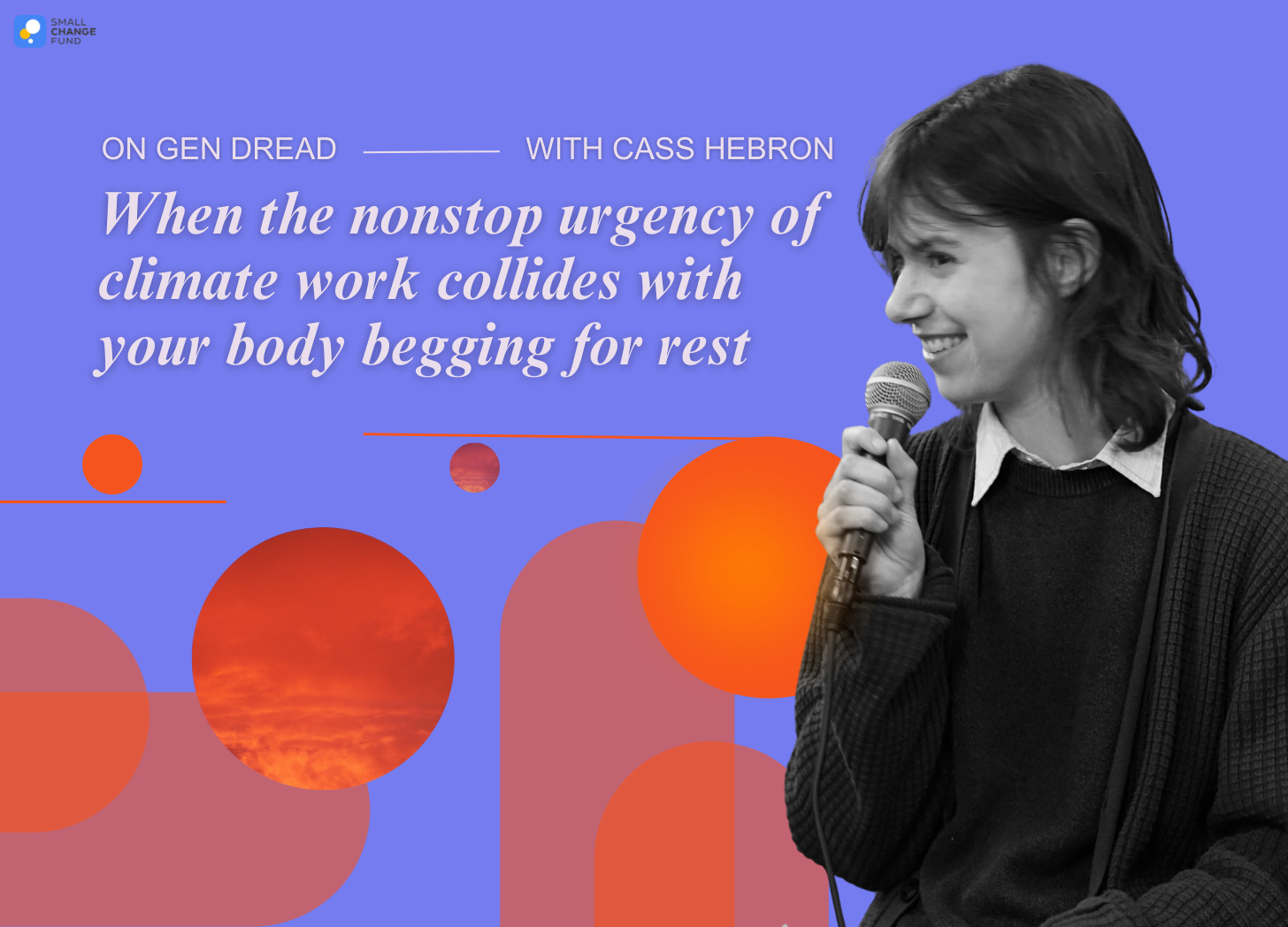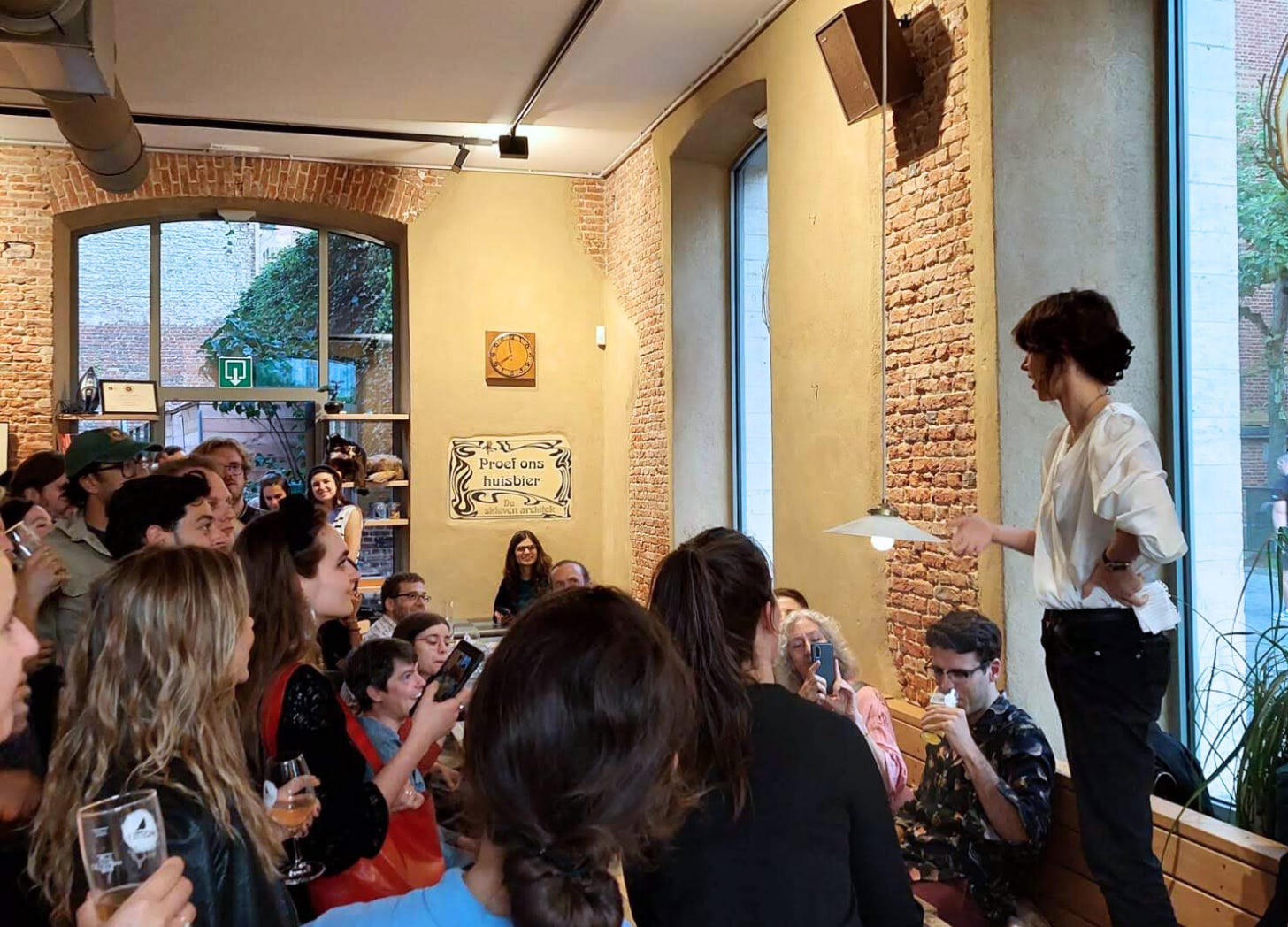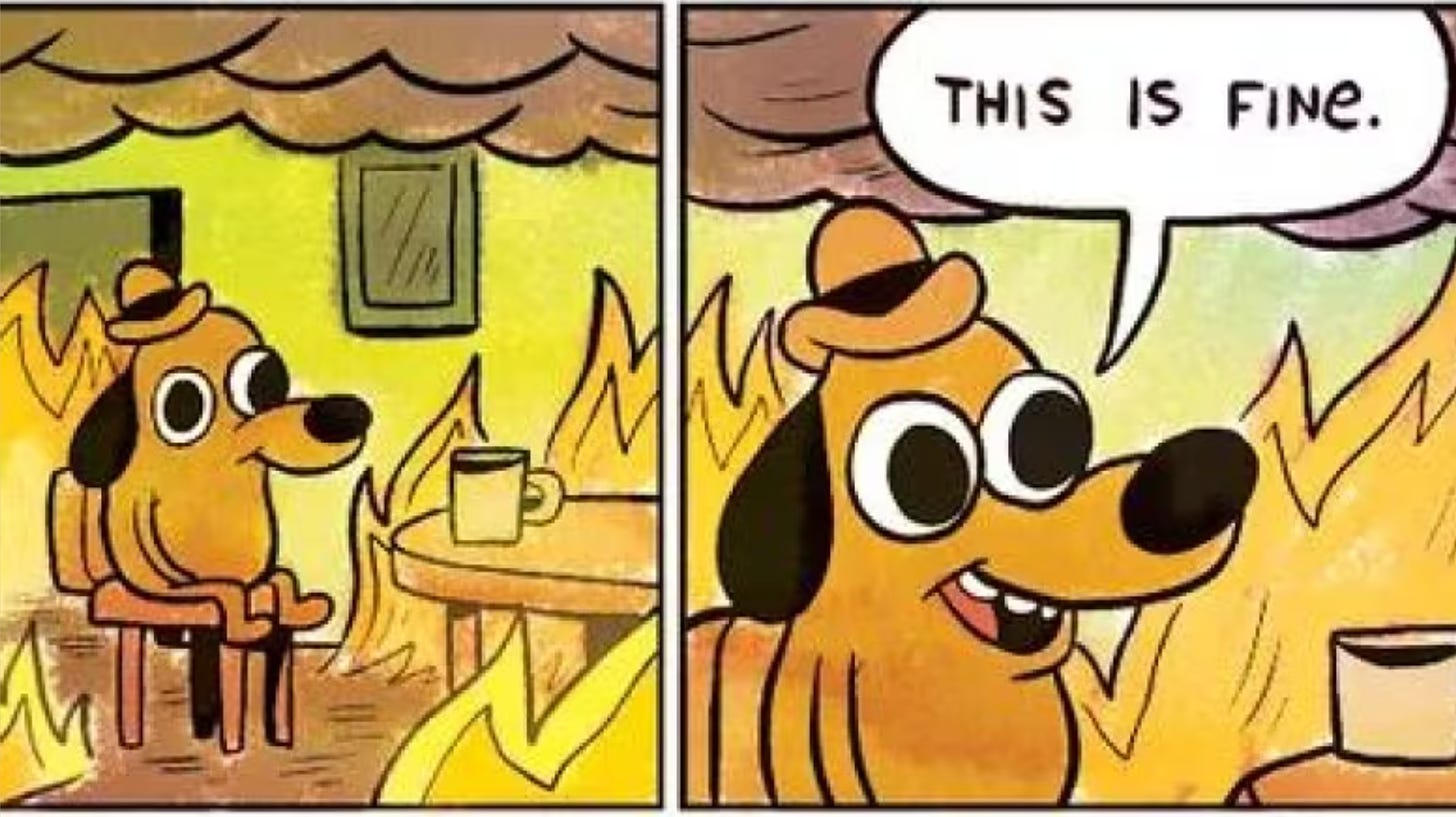When the nonstop urgency of climate work collides with your body begging for rest
European climate activist Cass Hebron shares her experience with intense burnout
At 25, Cass Hebron was working in climate policy in Brussels, pouring her heart into the movement, and writing her climate justice newsletter, The Green Fix – but her body was starting to unravel. She had reached a state of burnout so intense she opted to take dedicated time off to re-centre herself and heal.
With a bit of distance and space, Cass began to see some glaring hypocrisies in the values the climate movement claims to cherish versus the way it treats its people and their mental health. We had the great pleasure of talking to Cass about realizing she’d become an “accidental capitalist”.
How did you become an accidental capitalist?
There's a mismatch between what we preach and the way we work. We tend to exempt ourselves from the same principles we’re promoting. So, we talk about slow living. We talk about not taking too much from the Earth. We talk about staying within planetary boundaries and needing to transition to regenerative societies and economies. Yet we’re treating ourselves like expendable resources.
We’re viewing every hour in the day as something that could be extracted and used for productivity and labour. It felt ironic that I was working overtime and trying to advocate against capitalism, when that mindset of needing to exhaust myself, my time, my energy, that I was only valuable if I was working, is the exact same mindset that drives the current growth of an economy.
How do we reconcile the urgency of climate work and having a human body with finite capacity?
If you read climate news, you’ll notice that the world is ending. Every single day is the end of times. And after a while I was like, hold on a second: if it's always now or never, but it was also now or never two days ago and last week, then it's not actually now or never. Like, of course, the longer we take to address certain climate disasters and certain injustices, the worse the consequences will be in the medium- to long-term. But we can't live in this binary mentality of “if it doesn't all happen right now this second, then we're all doomed!!”
If we move away from the idea of doing as much as possible all the time, and focus on doing the most high-impact things and doing them well, and perhaps taking more time to actually embody the values that we live in, then we can sustain ourselves a bit longer.
What were the symptoms that you were burning out?
I’d assumed that burnout is a point where you keel over in the street. You just fall over like a Sims character. So I thought, “oh, but I'm still walking. I'm still going to my meetings and still answering things. I must be fine.” But I was on autopilot, and I didn't look forward to anything, and I wasn't motivated by anything. I was also incredibly cynical about the state of the world. I was fundamentally disillusioned with human nature. I was also really physically exhausted. Most of us have experienced this point where our bodies are telling us that they need a break. And we just ignore it because we're like, “nah, it's not a convenient time.”
So it was this mixture of psychological and physical. Your body's telling you to stop, but you've got all these psychological mechanisms like, “oh, but that's just because I didn't get enough sleep.”
Are you still on burnout leave?
No, I had to go back to work after three months because as a freelancer, I don't get paid leave. I was too stressed about money. So I never really took the time that I should have. It also wasn't very productive time off because I didn't have any plan or structure. I was just sort of drifting around and had no purpose. You need to have very structured support if you take burnout leave so it's not just about doing nothing – it's about doing things that bring you energy. But you can't do that if you have no money – it’s not real rest, it's just stressing. So I've been working ever since.
But it’s not about the individual taking burnout leave in the best way or any individual HR office having the best policy – it's the sector itself and its lack of funding creating this issue.
Has this experience changed how you work?
Yes. Before all this, I was writing The Green Fix, and I was explaining climate justice concepts in this very educational tone. And then I started writing about eco-anxiety and burnout and decided to be a lot more transparent about the emotional and psychological side of doing this work. So it's changed the way I write. Everyone just being a bit more honest is really helpful. Normalizing that conversation is so important. You can't just study planetary collapse every day and not feel something about that.
What would you say to people struggling to make that space for the psychological side of climate work?
I used to be so disillusioned because I would read climate headlines and everything was always seemingly getting worse. A big revelation was that I can't measure my individual impact or the value of this work compared to a global measurement of how well the world is doing. Because I will never feel fulfilled. I will never be able to attribute my impact. Because how do you count emissions that weren't emitted? Or heating that didn't happen? The value of our work is in things not happening. And you can never calculate that. You only see the bad things that are happening.
So instead I had to find other core reasons to keep doing the work if I was never going to get fulfillment from the world or validation from the usual work metrics like in a regular 9-5. I do this work because it does make me happy to live in a sustainable way. I don't do it because I think it's going to limit heating to 1.5 degrees, but I avoid flights because doing so makes me happy. Living low-impact gets me outside. It gets me talking to neighbours. It makes me feel more connected to the world around me.
Helping one person can include myself – like, if the only thing I did in the day was to take a day off for myself, then I still make the world better for one person. And that's been a really important switch for someone who doesn't prioritize time for themselves.
If you liked reading this, feel free to click the ❤️ button on this post so more people can discover it on Substack 🙏🏼
Making Waves
Climate change elicits diverse emotional responses shaped by individual experiences, so how do we individually and collectively feel about climate change, and what do those feelings drive us to do? Listen to My Climate Journey podcast with our own Britt Wray on Navigating Climate Emotions here.
In the face of environmental collapse, one woman wonders if the best way to protect a future child is not to have one at all. The Extinctionist is making its world premiere this April in NYC with Heartbeat Opera. Get tickets here.
This April, join Talk Climate to Me by Project Neutral - a free, award-winning, virtual climate education experience for women and allies! This is so much more than a course, it's a chance to join a strong and supportive community that wants to see you thrive alongside our planet. Learn more and sign-up here.
Join former Vice President Al Gore and an all-star lineup of thought leaders, experts, and organizers for a Climate Reality Leadership Training exploring the climate crisis today and the road to a sustainable tomorrow, set to take place April 12-14 in New York City. Apply to this free training before it closes on March 20th here.
On March 18, young activists & politicians from across party lines in Canada will come together to discuss the creation of a national Youth Climate Corps. Find a watch party in your area or sign up to host your own!
On Thursday, March 28th (3 - 4 pm ET) join a webinar on Climate Anxiety and Social Emotional Learning with a panel of experts, including our own Britt Wray, as they discuss the mental health impacts of climate change on youth and explore the role of schools and community-based agencies in fostering resilience.
We're fueled by you, dear readers, and we’d be so delighted if you'd consider becoming a paid subscriber or supporting us with a one-time donation through our partner, Small Change Fund. Thank you, truly, for being here 🙏🏼
‘Till next time!










Familiar to anyone who's ever been engaged in any kind of activism. The revolution / overthrow of patriarchy/ end of white supremacy/ rights for transgender folks are always - justifiably - overdue and urgent. With time, you learn to recognise the 'heading for burnout moment' and take your foot off the pedal a bit. And to know that you're not indispensable or the only person for a specific task. And also that, damn, you're less use when knackered, so give more effectively if you take regular rest and breaks. Our climate emergency centre here in Worthing (CREW) holds regular space for people whose climate anxiety or activism burnout is making them unwell or unhappy. Activism communities need to build care for those doing the work right in to the model. Some feminist and Global Majority activist spaces offer good models for doing this. We're all doing what we can, we're all making a difference. I realise that planetary survival is of a different order of urgency, but still, some of the tools of other movements could be helpful. Oh! And watch out for people who are using activism as personal demon-exorciser and making everyone around them feel guilty because they're not as committed / driven / angry as them. There's a lot of neurosis driven activism out there. Stay free from it.
This is a great post and one quite timely for me. I had just started to realise how odd it is that climate movements talk about creating radical change, but rely on systems of work that we now know aren't really great for workers, or even that productive. I'm actually suffering through a period of burnout before starting my climate-adjacent career, from my university experience and the difficulty of finding work in this field. This post gave me some ideas on how to move forward and hopefully prevent the same happening in the future. Thank you gen dread and Cass for sharing this.